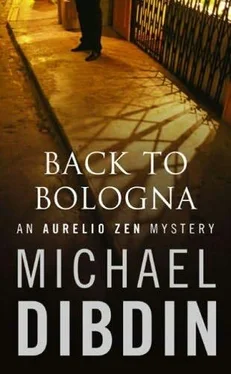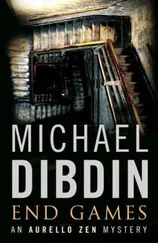Michael Dibdin - Back to Bologna
Здесь есть возможность читать онлайн «Michael Dibdin - Back to Bologna» весь текст электронной книги совершенно бесплатно (целиком полную версию без сокращений). В некоторых случаях можно слушать аудио, скачать через торрент в формате fb2 и присутствует краткое содержание. Жанр: Полицейский детектив, на английском языке. Описание произведения, (предисловие) а так же отзывы посетителей доступны на портале библиотеки ЛибКат.
- Название:Back to Bologna
- Автор:
- Жанр:
- Год:неизвестен
- ISBN:нет данных
- Рейтинг книги:5 / 5. Голосов: 1
-
Избранное:Добавить в избранное
- Отзывы:
-
Ваша оценка:
- 100
- 1
- 2
- 3
- 4
- 5
Back to Bologna: краткое содержание, описание и аннотация
Предлагаем к чтению аннотацию, описание, краткое содержание или предисловие (зависит от того, что написал сам автор книги «Back to Bologna»). Если вы не нашли необходимую информацию о книге — напишите в комментариях, мы постараемся отыскать её.
Back to Bologna — читать онлайн бесплатно полную книгу (весь текст) целиком
Ниже представлен текст книги, разбитый по страницам. Система сохранения места последней прочитанной страницы, позволяет с удобством читать онлайн бесплатно книгу «Back to Bologna», без необходимости каждый раз заново искать на чём Вы остановились. Поставьте закладку, и сможете в любой момент перейти на страницу, на которой закончили чтение.
Интервал:
Закладка:
It had to be admitted that the specialist whom Zen had gone to Rome to consult had viewed matters rather differently.
‘A good recovery,’ had been his verdict after inspecting the X-rays, inserting a monocular catheter like some giant tropical worm down Zen’s oesophagus, and vigorously kneading the flesh around the surgical wound as if intending to barbecue it later.
‘But I feel terrible,’ Zen had murmured in response.
‘Are you in pain?’
‘It’s not so bad now. But I feel totally exhausted all the time. The slightest effort, and I have to lie down for half an hour to recover. Walking up a flight of stairs leaves me breathless and dizzy. Even talking drains me.’
His voice dispersed like smoke.
‘That’s to be expected,’ the consultant replied with heartless nonchalance. ‘Your system is still healing. That leaves it less disposable energy for other tasks.’
‘I know, but there’s more to it than that. I just don’t feel myself any more. I don’t feel like me. And perhaps I’m not.’
The consultant closed Zen’s file with a flourish, then tapped the cover several times as though to emphasise the professional significance of this gesture.
‘Medically speaking, as I have already explained, the prospects for a full recovery are excellent. The duration of that process depends upon too many variables to quantify with any precision.’
He glanced pointedly at the clock, his interest in the case clearly at an end. Like a policeman who knows there is nothing more he can usefully do, thought Zen. In the past, he too had often made it brutally clear that he had no time to waste, but now any such attempt would ring hollow. The plain fact of the matter was that time to waste was all he did have.
Perhaps the consultant had allowed himself to be touched by the expression on his patient’s face, or perhaps he was more subtle than Zen had given him credit for. At all events, as they shook hands at the door, he asked an unexpected question.
‘Is your wife being supportive?’
Zen did not answer for so long that the silence finally became embarrassing. First he had to work out that his ‘wife’ must be a reference to Gemma, who had made the appointment for him at a time when he had felt too weak to deal with hard-bitten Roman personal assistants with an attitude as long as their credit card statements. As for the query itself, that seemed unanswerable. The story was far too long and complex to sum up in a few words. It would take hours to explain even the bare outlines of the situation.
‘Supportive?’ he managed at last.
The consultant clearly wished that he had never spoken.
‘Oh, just generally,’ he said dismissively. ‘You’ve got to remember that the whole business must have been disturbing for her too. In fact it’s often harder for family members than for the patient, oddly enough.’
Zen thought, but no words came.
‘She’s been…’ he began, and broke off.
The consultant nodded with transparently fake enthusiasm, murmured ‘Good, good!’ and walked quickly away.
One feature of Zen’s condition that he had not bothered mentioning was that bits of his body he had never used to think about now demanded his constant attention, while others, on which he had unconsciously depended, were now conspicuous by their absence. It thus came as no particular surprise that the dull roar in his ears suddenly receded to a distant murmur, while the shrilling of his mobile phone a moment later sounded perfectly normal. He studied the strip of transparent plastic where the incoming call was identified for the length of five rings before answering.
‘I’m on the train. We were in a tunnel.’
‘How did it go?’
It took Zen some time to answer.
‘It was a normal tunnel,’ he said at last. ‘Perhaps a bit longer than most.’
‘Tell me what the doctor said.’
‘I just did.’
‘Are you feeling all right?’
‘The doctor says I’m fine. It’s just that I’m in a long tunnel.’
‘But there’s light at the end of it?’
‘No, it’s dark now. It must be there too, surely.’
Asound like some cushions make when sat upon.
‘What time do you get in?’
‘I don’t know.’
‘Do you want me to pick you up? I was thinking of going to a movie.’
‘Go, go! I’ll take a cab. Or walk.’
‘What about dinner?’
‘I had a huge lunch and I’m not hungry. Go to your movie. I’ll let myself in and…’
He broke off, realising from the increased background noise and air pressure that the train was sheathed in yet another tunnel, cutting off the conversation between him and Signora Santini.
Not that it took much to do that these days. The cut-offs, drop-outs, robotic acoustics, phantom voices and dead silences in their communications were becoming more frequent all the time, as if the entire network had gone bust and was being progressively run down. He could have sworn that her very voice-the voice he had fallen in love with on the beach in Versilia that memorable summer-had become harder and more strident, appending an unspoken ‘take it or leave it’ edge to the most commonplace remark. And he sensed that authentic anger, concealed like the raw hurt of his own mangled bowels, lay just below the surface of quotidian banality, securely rooted and feeding, for the moment, on itself. In short, the affectionate, calm and dependable woman he had fallen in love with had grown distant, capricious and tetchy. So it seemed, at least, but Zen accepted that he was the least reliable of witnesses. A stranger to himself, what could he know of others?
The earlier mention of food pushed him out of his seat and along the carriage, grabbing at each seat-back to keep his balance, precarious everywhere these days. In the buffet car he bought a plastic-wrapped ham roll and a can of beer and carried them over to an elbow-high ledge by one of the windows, where his double was already installed. Maybe she had met someone else when he was in hospital. Or indeed before, during the period when he had been away on his last case. Or before that. It wasn’t unlikely. Both partners are always at least subliminally aware of the balance of power in their relationship, and the fact was that Gemma was younger than him and still very beautiful. Moreover, he knew that she had enjoyed a certain reputation for flightiness before they got together.
He munched his way ravenously through the roll, having lied to Gemma about his ‘huge’ lunch. In his present state, Zen could only achieve anything by breaking the task down into small, achievable subsets and then concentrating wholly on performing them, to the exclusion of all else. Today his chosen assignment had been to get to the consultant in Rome in time for his appointment. He had accomplished this, but at the price of forgetting totally about other matters, such as making an appearance at the Ministry and possibly seeing his friend Gilberto. He had even forgotten to eat. There were times when he remembered his period in the clinic almost with nostalgia. Everything had been so simple then. No one expected you to be competent or to take any initiatives. On the contrary, such behaviour was frowned upon. The staff told you what to do and when to do it, and you obeyed them. There was no need to plan or act. In retrospect, it had all been very relaxing.
He finished the rather dry roll, washing it down with the rest of the beer. To be honest, he realised, the visit to the consultant had been just a pretext. His real reason for going had simply been to go, to escape the encircling walls of Lucca. This massive brick barrier had once seemed reassuring, but after one month bedridden and another confined to the apartment in Via del Fosso, it had become as spiritually suffocating as it literally became in high summer, shutting out every open perspective and refreshing breeze. No doubt that was why he had arrived in Rome hours before his appointment, killing the time by sitting around in cafes and gazing mindlessly at everyone who came and went, like a tourist. And afterwards, instead of taking the first train north, he wasted further hours at a cinema in a seat so close to the screen that the movie was an incomprehensible blur. Now, though, he was on his way home, this brief spell of parole at an end. It could be prolonged slightly by deliberately missing the connection at Florence, so that by the time he arrived back at the apartment, Gemma would with any luck be asleep.
Читать дальшеИнтервал:
Закладка:
Похожие книги на «Back to Bologna»
Представляем Вашему вниманию похожие книги на «Back to Bologna» списком для выбора. Мы отобрали схожую по названию и смыслу литературу в надежде предоставить читателям больше вариантов отыскать новые, интересные, ещё непрочитанные произведения.
Обсуждение, отзывы о книге «Back to Bologna» и просто собственные мнения читателей. Оставьте ваши комментарии, напишите, что Вы думаете о произведении, его смысле или главных героях. Укажите что конкретно понравилось, а что нет, и почему Вы так считаете.











